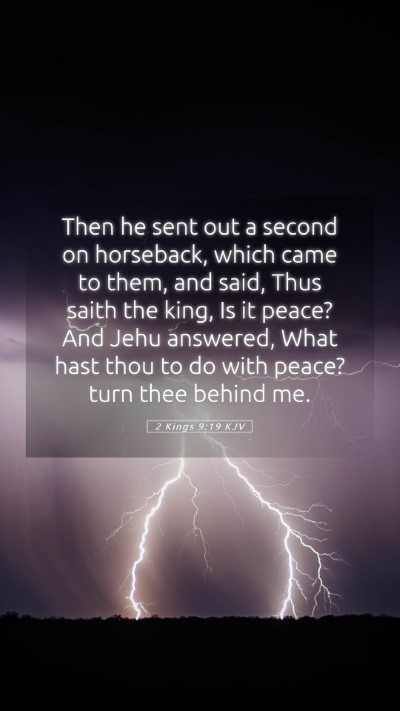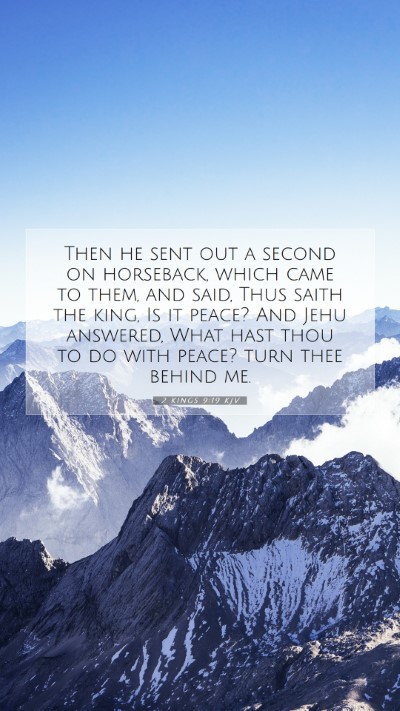Understanding 2 Kings 9:19 - A Comprehensive Bible Verse Commentary
Bible Verse: 2 Kings 9:19
Verse Text: "Then Jehu the son of Jehoshaphat the son of Nimshi conspired against Joram. Now Joram was defending Ramoth Gilead, he and all Israel, because of Hazael king of Syria."
Introduction
This verse introduces a significant moment in the history of Israel, highlighting a convergence of political machinations and divine prophecy. Understanding this verse requires an analysis of its historical context and theological significance, which can offer profound insights for Bible study groups and online Bible studies. Explore with us as we delve into the Bible verse meanings and interpretations of 2 Kings 9:19.
Historical Context
Understanding the situation: At the time of this event, Israel was under the rule of Joram, the son of Ahab, who continued the idolatrous practices established by his father. Jehu, a commander in the army, was anointed by God through the prophet Elisha to end the reign of Ahab's lineage and to bring judgment upon them, as prophesied.
Commentary Insights
- Matthew Henry's Commentary: Emphasizes the providence of God in raising up Jehu to accomplish His purposes and removing the corrupt royal lineage. This reflects a divine strategy amidst impending danger, showcasing the dynamic of human rebellion versus God's sovereign plan.
- Albert Barnes' Notes: Points to the significance of Jehu being described as the son of Nimshi, indicating his lineage and reinforcing the idea of divinely appointed authority even among military ranks. The verse also showcases a narrative shift, focusing on Jehu's conspiratorial nature which was divinely sanctioned.
- Adam Clarke's Commentary: Discusses the political tensions of the time, noting the conflict with Hazael, king of Syria. Clarke draws attention to the military conflicts that were reoccurring in this historical period, further emphasizing the backdrop against which Jehu's rise occurs.
Bible Verse Interpretations
The interpretation of 2 Kings 9:19 requires understanding both the immediate narrative and its larger implications. The text illustrates the tension between human actions and divine purpose, a recurring theme in Scripture.
Key Themes:
- Divine Sovereignty: This verse shows how God orchestrates events in history to fulfill His will, as seen in selecting Jehu.
- Judgment and Deliverance: Jehu's rise to power represents both judgment against evil and God’s deliverance of His people from oppression.
- Conflict and Conspiracy: Highlights the political intrigues of the time, providing a framework for understanding the complexities of leadership and morality.
Biblical Exegesis
The exegesis of this verse invites deeper reflection on God’s integrity in judgment and the human efforts to respond to divine calling. In conducting a scripture analysis, we can discern that Jehu's appointment is both a fulfillment of prophecy and a necessary action against wickedness in leadership.
Application of the Verse
For modern believers, this verse prompts reflection on the nature of leadership and the moral responsibilities that come with authority. It serves as a reminder that God often uses unlikely individuals to carry out His plans. Through Bible study tools and resources, we see practical applications emerging for our leadership roles, be they in the community or personal lives.
Cross References
This verse is connected to various other passages in the Bible that enrich its meaning:
- 1 Kings 19:16: God's instruction to anoint Jehu.
- 2 Kings 10:30: God's promise to Jehu for his actions against Ahab.
- 2 Kings 8:28-29: The conflict between Israel and Judah.
Conclusion
In summary, 2 Kings 9:19 encapsulates critical themes of divine sovereignty, judgment, and human agency. It exemplifies how God leads history through chosen instruments, often in the face of opposition and adversity. Those who seek to understand Scripture can find wisdom in this verse about God's overarching plans and the purpose behind their fulfillment. Engaging with Scripture through Bible study guides and lessons can help unlock further insights into such passages, offering clarity and guidance in interpreting biblical narratives.
Further Study Recommendations
- Explore related historical context and figures in the Old Testament.
- Join Bible study groups focusing on Old Testament narratives.
- Consider how the themes of this passage relate to modern leadership and ethics.


